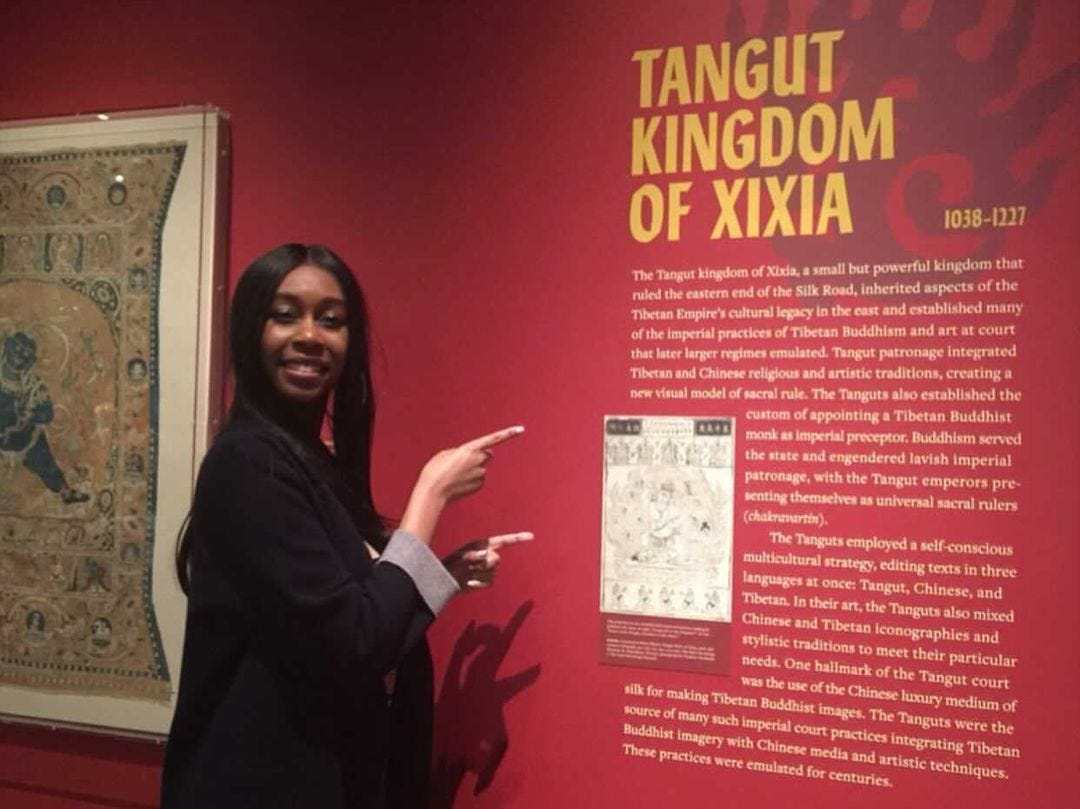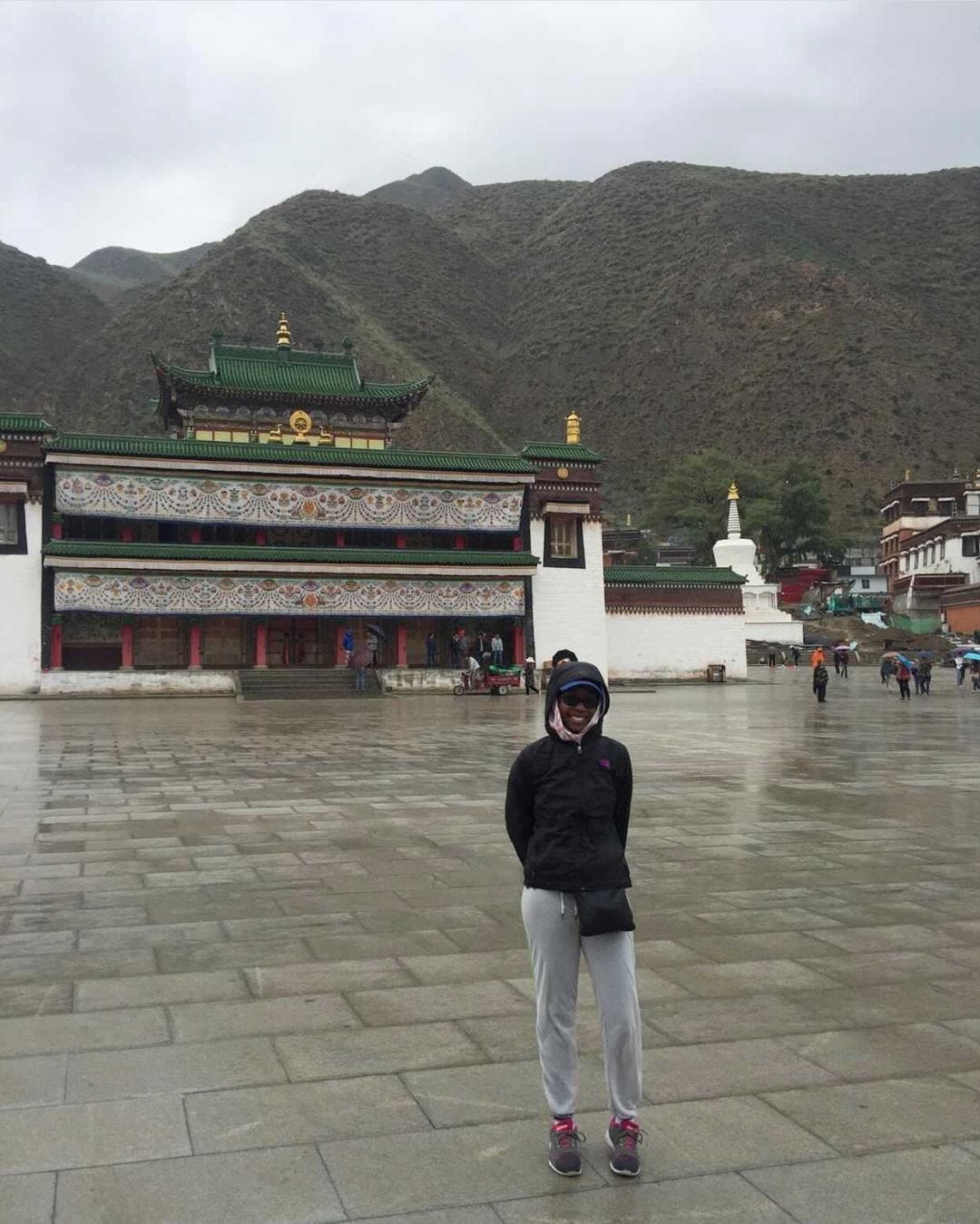Happy Juneteenth! From a Black Hindu American.
Juneteenth is a holiday that primarily celebrates the emancipation of enslaved Black Americans, dated June 19, 1866 (“June” + “Nineteenth” = “Juneteenth”). This holiday also widely celebrates the beauty and existence of African American culture, where celebrations often include lectures, exhibitions, and performances to educate all about Black culture as well as advocacy for further fundamental change in the U.S.
I’m a Black American and a proud Hindu. This is my story.
My Introduction:
I’m from Cleveland, Ohio. I graduated from John Carroll University in 2019 with a BA in English: Literature and East Asian Studies. During my undergraduate studies, I was awarded a special grant to participate in a Silk Road Research Fellowship and traveled throughout many parts of Northern China for her university during the summer of 2017, locations such as Xi’an, parts of Tibet, as well as the Xinjiang Province.
Image: A Kindergarten class at the Zhengzhou Museum, Zhengzhou, China 2017.
This very fellowship would jumpstart my research endeavors in East Asian Archaeology. Shortly after graduating, I traveled back to Beijing, China to pursue my Fulbright Study/Research grant from September 2019 - June 2020, but was cut short to February of 2020 due to the COVID-19 Pandemic. My Fulbright project and prospective dissertation focus on analyzing Tangut Buddhist art and iconography within an archaeological site known as Yulin Cave #3, located near Dunhuang in the Gansu province of China.
Image: The Rubin Museum of Art - Tangut Kingdom of Xixia at the Faith and Empire exhibition, 2019.
Image: Labrang Monastery visit. Xiahe, China, 2017.
I also formerly worked as a Teaching Assistant in Economics for the Department of Economics and Finance while studying at my alma mater. I enjoy writing, drawing, watching (and re-watching) Disney movies, music, fashion, makeup, and video games. A fun fact is that I can read and write in Mandarin and know some Italian. My specializations include Buddhist theory, Indian religions, African American literature, Colonial Indian literature, gaming theory, East and South Asian art, cultural studies, and world economics.
Hinduism Introduction (my experience with it):
I first discovered Sanatana Dharma when I was as young as 13 years old. I’ve always loved reading just about anything. This also was around the time I was learning Mandarin and educating myself on the different cultural aspects of East and Southern Asia. One day, I happened to come across excerpts of the Atharvaveda. I fell completely in love with the few hymns that I have read. Throughout high school into my college years, I continued to read other texts such as the Rigveda, Bhagavad Gita, excerpts of the Shakta Agamas, Upanishads, and much more! This interest I had in the text soon turned into a passion, or something much more than that. By the beginning of my freshman year, I made the decision to follow Sanatana Dharma. What I love most is how I learn something new every single day. It is the gift that keeps on giving.
Dharma furthering the importance of social justice that pertains to the black community:
“Dharma” has no single word definition; it has many meanings. I often see Dharma associated with the ideas of “justice,” “duty,” and “righteousness” which often apply to not only the order of the universe but also to the customs and behaviors of individuals.
As individuals, we have the duty to uphold appropriate and morally correct behavior, while calling out immoral and cruel actions. This involves our responses to racial injustice and inequality.
As a Black American, I am very passionate about helping to demand the long list of changes needed for my people, whether it be for police reform, housing inequality, wealth disparities, etc. As a follower of Sanatana Dharma, I am put in a unique place where I often use Dharma as my map to continue advocating for social and systemic change.
I am able to connect with people from all walks of life to educate and share my perspective and vision, to emphasize the importance of justice for my community and how it ultimately serves us all. Bhakti Tirtha Swami has become one of my biggest inspirations. He deemed himself successful in his work in civil rights activism, international relations, and academia to then use his faith to continue advocating for change later in his life. Plus, he was from my hometown of Cleveland!
Have I experienced Hinduphobia?
Oh yeah, a number of times. Most times they were microaggressions such as misassociations. Examples include being called a “Hare Krishna'' (I follow Shaivism) as well as having people associate the religion with cultism or extremism. I did not experience any of this while traveling back and forth to China. In fact, many people were enthusiastically curious. I’ve come to realize over time that much of the Western Hinduphobia that I’ve experienced is due to severe ignorance. The most widely known Hindu practice that people know about here in the USA is ISKCON, who were technically called “Hare Krishnas” during the ’80s, meanwhile many people don’t have the knowledge of the hundreds of other Hindu traditions.
Western criticism of Hinduism and the association of cultism and extremism date back to the colonial eras, where Hindu gods were often demonized for their “strange” appearances, which gave reason for the outsiders to demonize the people of the region.
The reason I mention both of these things is that my experiences with Hinduphobia often serve as an opportunity for me to properly correct others on misconceptions and raise awareness about the dangers of just microaggressive actions.
Anything else? 😉
While making my next move towards graduate education, I’m a writer and researcher. I just published my first article! My very first published article is now live and available on Amazon in the book titled Fulbright in a Time of COVID: Essays by US Fulbrighters in Asia, 2019-20. My Fulbright cohorts and I came together shortly after our early departure from host countries and decided to write articles about our experiences in Asia leading up to the pandemic, to soon self-publish this collection of essays. The name of my essay (starting on page 47) is titled "Great Peking Records of the Eastern Region: The Account of a Young Scholar's Life in China, Preparatory to a Global Crisis."
My Essay: Now available on Amazon!
This essay details my life in China as a Fulbrighter before Covid has impacted my trip. I talk about my ups, my downs, my day-in-the-life research schedule, building strong friendships, and overcoming challenges I faced while living and studying in China. I highly encourage you to read the other essays written by my cohorts in the book. Each individual experience is unique in its own way. The paperback is only $6.14 or you could get it on kindle for 99 cents. So please get a copy.
Here is the link to purchase the book.
Thank you all so much!
My Instagram is @_tinkerrbelle. I am also on the executive board for the Instagram profile and blog Shanti Sisterhood (Instagram: @Shantisisterhood). I occasionally provide research for some posts.








Hi, my name is Maya Ram. I am a volunteer with Mission Kaali, a group that raises awareness of rampant conversion activities by Christian missionaries in India. I would like to do an interview with you for Mission Kaali's youtube channel. I think your story is very interesting and I think our audience will benefit from hearing it.